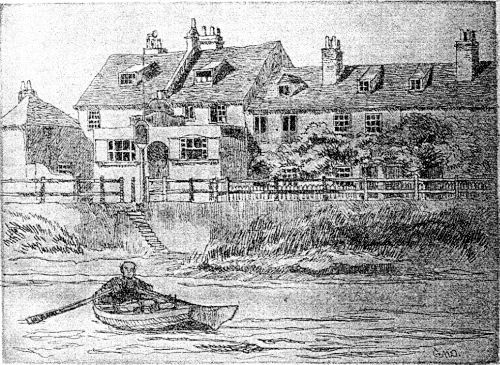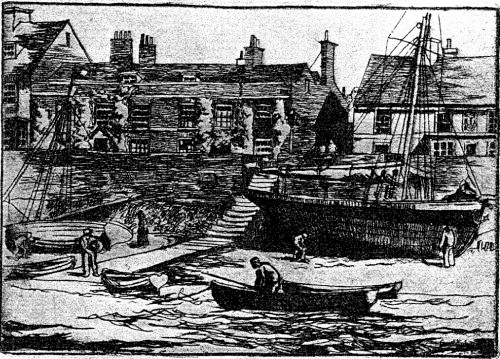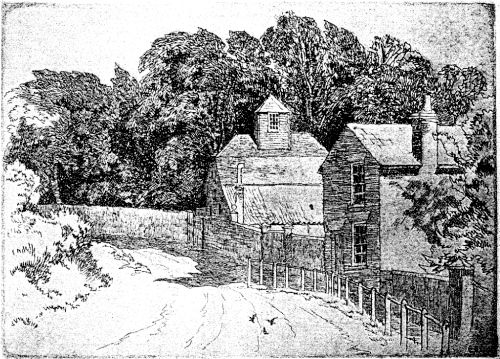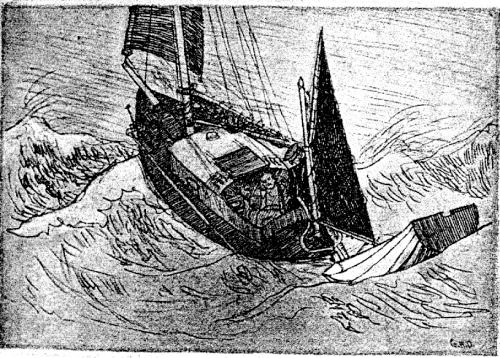Small Craft
Late 19th & Early 20th Century British Yachting
The Sailors: Amateur British & Irish Yachtsmen Before World War One
The Wrigglings of the Eel
by
Ernest Hicks Oliver
THE cruises of the Eel are well known to readers of the YACHTING MONTHLY through the logs of Mr. George Holmes, but since she passed out of his hands she has rather slipped into obscurity, and it is in the hope that her doings may still be of interest that I have ventured to jot down this short account of her wanderings since I became her owner. But there is not much to tell; the steady old boat takes one there and back almost without incident.
All of us set out to sail with the idea of having a good time, and we usually succeed in having it. The only point of interest is that opinions differ as to what constitutes a "good time," and we only fail when the ideas of different people in the same boat happen to clash. Some like to brave the breeze and laugh at the groaning gale; others are content to meander from port to port whilst a gentle breeze allows; while others prefer to take their pleasure on the smooth waters of a land-locked estuary or on the miles of inland waters to be found on the Norfolk Broads. I should like to confess at once that I have little use for hard winds. I am perfectly satisfied to regard a cruise as a good one when nothing particular happens, and one makes one's port in a quiet and orderly manner. As a record therefore of an adventurous or a strenuous time these notes must be regarded as a failure; nevertheless they are an account of a good time, and one thoroughly enjoyed by the ship's company.

Burnham-on-Thames.

Burnham-on-Crouch.
It was blowing very hard all that afternoon, and, as the day was getting on, we decided to stay at Greenhithe for the night. The journey thence down the river was one of our strenuous days. It was again blowing very hard, and we made the cruise under full mainsail. It was one of the few days that we sailed with the main sheet uncleated.
The wind had somewhat moderated by the time we were at the mouth of the Medway, but on arriving there we found the boom across the river, with just a little opening to allow of boats going through. We had not given much thought to war up to then, viewing the trouble between Austria and Servia as being very far away. Seeing the boom we began to think that there was a probability of our being dragged into trouble. So we tacked up to Cockham Woods, and here dropped anchor for the night, passing on the way the Aboukir, the Cressy and the Hogue, little dreaming that in a few weeks' time these fine little cruisers would fall victims to a German submarine with dreadful loss of useful lives. No sooner had we landed in the dinghy than we saw a picket boat coming down the river, steering for the Eel. A bluejacket standing in the bows was shouting through a megaphone that all boats were to remain stationary till next morning. We then realized that the European situation was getting serious. The last time we were on the Medway the Eel had wriggled her way up through Rochester and past Aylesford to Maidstone, and I had thought of doing the same again; but in view of the unsatisfactory state of things it seemed right to get away from the river of the Royal Dockyard and try some less official waterway.
The wind was from the S.W. next morning, blowing hard, so we put a reef in the mainsail and left the mizen furled. As it turned out, it would have been better if we had put three reefs in, but up the river, sheltered as we were, it was difficult to gauge the strength of the wind. While it was more or less behind us we made short work of getting down the river, and once more passed the boom at Sheerness, but at the Nore a nasty squall struck us and, for once in a way, my efforts for a quiet life seemed likely to be unsuccessful. A sloppy sail was ours that day, and if I had known what was in store I think I should not have left the shelter of the Medway. We came through the Swatchway, and, as someone on board had mentioned Mersea at breakfast, we were striving to get there, but in turning for the beat into the Blackwater we found the conditions were so fierce that we decided to do the rest of the cruise under jib and mizen only. It was four hours later when we found a mooring opposite Mersea Hard, and three very cold and weary sailor-men went ashore to find something hot to eat and drink. We had had a good deal of spray over us since we turned, and two heavy rain squalls had certainly not warmed or heartened us.

At West Mersea.
Next day we saw Mr. Tredwen in the Pearl, so we went over in the dinghy to look over the ship which was new to us. We were lost in admiration at tne completeness of everything, and much envied the owner the various comforts he has on board. Seated in the comfortable saloon, with the revolving chairs, the piano and large swing table, it seemed impossible to imagine that we were in a boat that is sometimes sailed single-handed, and one which frequently cruises with a crew of only one, summer and winter.

A Rain Squall.
Next morning a thick haze had settled down on the river, and we had to anchor just outside the Haven till it cleared. This loss of time and the light wind which subsequently sprang up upset our plans in trying to get above London Bridge on the tide, so at Greenhithe I arranged with a waterman to tow us up as far as the tide would allow. He managed to get up as far as Battersea, and here we anchored between two rows of barges just opposite the church, a not very attractive anchorage with the smell of coal from the barges and the tide making a great fuss hitting their bows, and that evening was made still more melancholy by the drowning of one of the children bathing from the shore near us, and the subsequent dragging for his unfortunate little body. We went off in the dinghy as soon as we realized that a child was drowning, but arrived on the scene too late to be of any use. It seems that the authorities try to stop the boys from bathing there, but without success. The little rascals were at it again next morning, in spite of the fatality of the evening before, some of them first rolling in the mud and smearing it right over their faces and heads, so that they looked just like little blacks, and then swimming out to the Eel to show how pink the water had made them.
From Battersea we proceeded up the river, sometimes sailing, sometimes quanting, but mostly towing. Ultimately we got as far as Cliveden Woods, but that part of the trip is another story. It is only mentioned to show the variety of cruising one is able to get out of the Eel. For a boat of her size - but there, you know exactly what I was going to say. I need not press an owner's delusions.
The Yachting Monthly, January, 1915